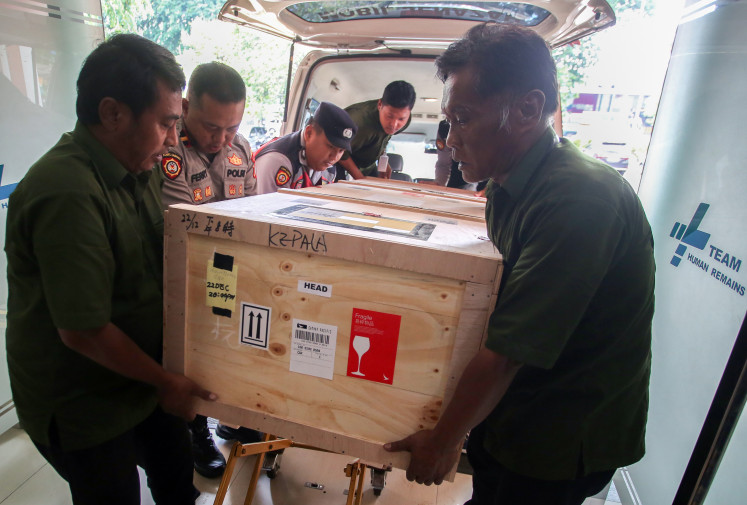Popular Reads
Top Results
Can't find what you're looking for?
View all search resultsPopular Reads
Top Results
Can't find what you're looking for?
View all search resultsHow Indonesia-Singapore tax treaty may impact trade, investment
The economic relationships between Singapore and Indonesia has been expanding rapidly. Two-way trade in goods totaled US$34.4 billion in 2018, with a deficit of $8.5 billion for Indonesia due largely to oil and gas imports.
Change text size
Gift Premium Articles
to Anyone
A
fter five years of negotiations, Singapore and Indonesia finally agreed in late January to renew their double-tax agreement, simply called the tax treaty, to resolve issues such as double taxation on certain types of active or passive income (dividends, royalties, interest). It regulates cross-border tax rates and overrules the general tax rates stated in the laws. There are currently only 3,000 bilateral income tax treaties in the world, which means tax treaties are targeted to specific partners, such as Singapore and Indonesia.
Singapore-Indonesia economic ties have been expanding rapidly. Two-way trade in goods totaled US$34.4 billion in 2018, with a deficit of $8.5 billion for Indonesia due largely to oil and gas imports.
Singapore is the biggest foreign investor to Indonesia with foreign direct investment (FDI) of $9.2 billion in 2018, or 31 percent of total FDI that year. That was ten times as much as in 2001. Japan (17 percent) and China (8 percent) followed in second and third place. Most of the FDI went to manufacturing at 26.56 percent.
Given the broad economic ties, it simply makes sense for the two countries to better manage their tax affairs so as to improve tax administration and increase tax revenue for public sector (government) spending.
Judging from the provisions in the renewed tax treaty, Indonesia is eager to attract more investment from Singapore. The treaty lowers royalties and tax rates on branch profit. The rate for branch profit has been cut from 15 to 10 percent, while royalties were cut from 15 to 8-10 percent. Under the old treaty, the tax rates were 25 percent for branch profit tax. The tax rate for manufacturing-related industries (8 percent) is lower than the general rate (10 percent). This reflects Indonesia’s aim to develop the manufacturing sector.
However, the question is whether the cut in tax rates woo more investment to Indonesia. Research on the relationship between tax treaties and investment show varied results. Studies by Bawono Kristiaji (2020), Tom Coup, Irina Orlova, and Alexandre Skiba (2009) and Ronald Davies (2003) did not find any significant relation between tax treaties and FDI. Meanwhile, studies by Eric Neumayer (2007) and Fabian Barthel, Matthias Busse and Eric Neumayer (2010) show a significant positive relationship.
A 2018 study by the Fiscal Policy Agency of the Finance Ministry shows no significant effect of the Indonesia-Singapore tax treaty on FDI flows. The study used the 1985-2016 period as a sample. The results suggest that trade cost instead is the significant determinant of FDI flow between the two countries. It indicates that Singaporean investors’ draw to Indonesia is resource-seeking, which means investors look particularly for natural resources, raw materials and cheap labor that are unavailable in Singapore. The final intention is to export the output back to Singapore. That is why the FDI is very cost sensitive.
With the inconclusive academic results, we can assess the potential impact of the treaty by comparing tariffs of, for example, the branch profit tax and royalty tax rate with other countries. The data show that other countries in Southeast Asia actually have lower cross-border tax rates than Indonesia, such as Hong Kong and Vietnam. The fact that we lowered the tax rate for Singapore could be an incentive to potential new investors to invest in Indonesia.
The government seems well aware of the inconclusive results of studies on the tax treaty impact on FDI and the nature of Singapore’s investment in Indonesia. But a tax treaty is not the only means or policy to attract investment from Singapore. Indonesia also uses regional economic groupings such as ASEAN and comprehensive economic partnership agreements to woo more FDI.
Indonesia and Singapore also signed the agreement on Promotion and Protection of Direct Investment in 2018. Hence, the renewed tax treaty will broaden the bilateral economic relationship.
Beside the fact that Indonesia has comparative advantages, such as natural resources, Indonesia could also work on other things, like regulatory reform, to increase FDI from Singapore. Given that Singapore is an investment hub, such “facilities” could hopefully multiply the investment potential from countries outside Singapore.
***
The authors are economists at the Finance Ministry’s Fiscal Policy Agency. The views are their own.










